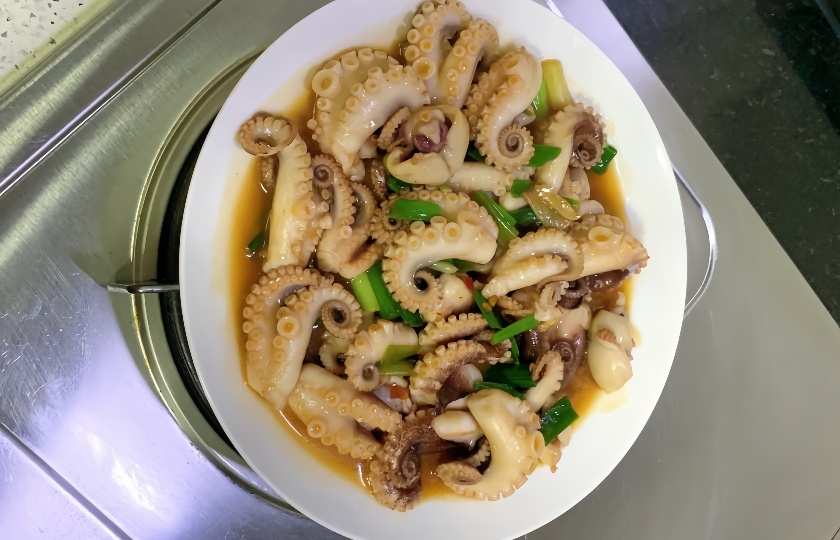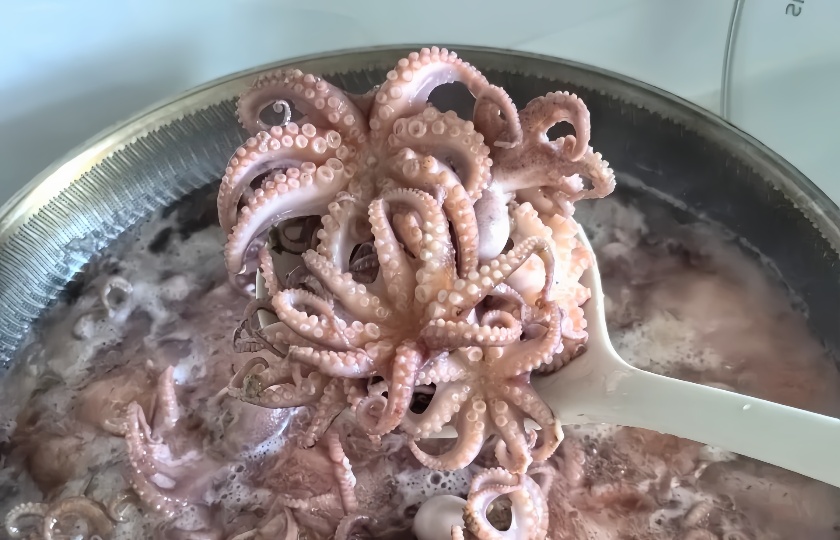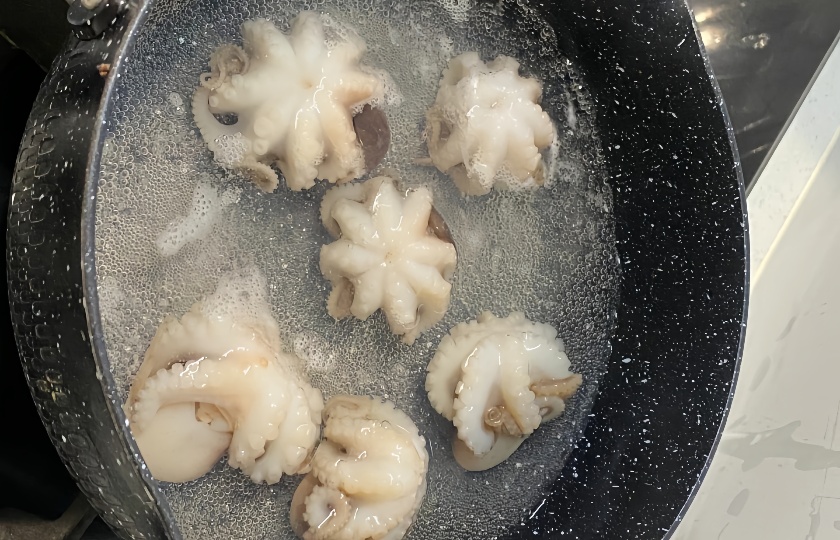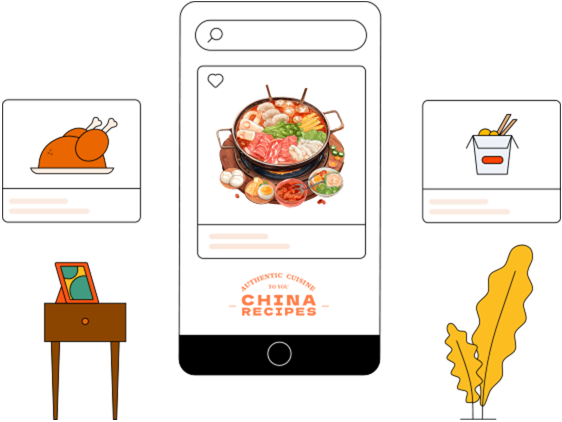Ingredient Peculiarity: Why Does Octopus Shrink When Cooked?
 Hey food lovers! Have you ever noticed something amazing? Every time you cook octopus, it seems to magically shrink in size. Why does this happen? Let’s dive into this fascinating phenomenon.
Hey food lovers! Have you ever noticed something amazing? Every time you cook octopus, it seems to magically shrink in size. Why does this happen? Let’s dive into this fascinating phenomenon.
Why does octopus shrink when you cook it?
1. Changes at the Cellular Level
Increased Cell Membrane Permeability:
When cooking octopus, the high temperature causes the cell membranes to become more permeable. It’s like opening a tightly closed door, allowing substances and water inside the cells to leak out. As the cell contents seep out, the octopus’s volume decreases.
Changes in Intracellular Substances:
The cells in octopus contain various organic substances and electrolytes. When heated, the state and distribution of these substances change. For example, proteins and polysaccharides that were stable at lower temperatures may undergo structural changes, disrupting the osmotic balance within the cells. Once this balance is disturbed, water moves from inside the cells to the outside, causing the octopus to shrink.
2. Contraction of Tissues and Organs
Muscle Contraction:
Octopus has well-developed muscle tissues. When exposed to high temperatures, the interaction between actin and myosin proteins in the muscles changes. These proteins bind more tightly together, causing the muscles to contract. This contraction is widespread, affecting the tentacles and other muscle areas, leading to a noticeable reduction in size.
Effect of Connective Tissues:
The connective tissues in octopus contain collagen and other components. When cooked, high temperatures cause the collagen to denature. Originally elastic and stretchable connective tissues contract and harden. This change pulls the surrounding muscles and other tissues together, enhancing the overall shrinkage of the octopus.
3. Evaporation and Loss of Water
Water Evaporation:
When cooking octopus, the hot water environment causes the surface water to evaporate rapidly. Additionally, as mentioned earlier, physiological changes cause water to seep out from the cells and tissues. This dual effect leads to a significant reduction in water content, causing the octopus to shrink noticeably.
Should I Wash Octopus Before Cooking?
Absolutely, you should wash it!
From a hygiene perspective, octopus can easily get dirty during catching, transportation, and storage. It might have sand, dirt, various microorganisms, and even harmful chemical residues. Just as we wash vegetables and meat thoroughly, cleaning octopus is crucial for food safety. This ensures that any potentially harmful substances are removed, allowing you to enjoy your meal without worries.
Additionally, washing the octopus affects the taste of your dish. Octopus secretes a slimy substance, which, if not cleaned off before cooking, can produce an unpleasant fishy odor that can greatly affect the flavor of your dish. Moreover, there may be some residual innards on the surface of the octopus that, if not removed during cleaning, can also spoil the final taste.
Here’s how to properly clean octopus:
Rinse Under Running Water: Start by rinsing the octopus under running water to remove larger particles like sand and dirt.
Soak in Salt and Vinegar Solution: Soak the octopus in a solution of water with a little salt and white vinegar for 10-15 minutes. The salt helps kill some microorganisms, and the vinegar effectively breaks down the slime on the surface, making the cleaning more thorough.
Final Rinse: Finally, rinse the octopus again with clean water.
Now your octopus is clean and ready for cooking!

How to Tell if Octopus is Fully Cooked?
To determine if octopus is fully cooked, you can check the following aspects:
Visual Changes
Color: Raw octopus is semi-transparent and pale, often a light pink or grayish color. When cooked, it turns a deeper color, typically white or light beige, due to protein denaturation, similar to how egg whites change when cooked. The tentacles of the octopus will also become more opaque, uniformly colored, and lose their raw sheen.
Texture: Raw octopus is soft and elastic, resembling soft rubber. When cooked, it becomes firmer. Look for a smooth surface on the body and tentacles. If you gently pinch it with chopsticks and it holds its shape, it’s an indication that it’s starting to cook through.
Internal Temperature Test
Use a food thermometer to check the thickest part of the octopus (such as the center of the body). When the internal temperature reaches 160-175°F (70-80°C), it’s generally cooked. This temperature range is sufficient to kill harmful microorganisms, ensuring it’s safe to eat.
Taste Test
Raw octopus is excessively chewy, while cooked octopus should have a moderate elasticity. Take a bite; it should be firm yet not tough to chew. If the octopus is difficult to bite through, it might not be cooked enough. Conversely, if it’s overly soft and lacks elasticity, it’s likely overcooked.
Should You Add Salt When Cooking Octopus?
Adding salt when cooking octopus is optional and depends on your preference.
Benefits of Adding Salt:
Flavor Enhancement: Like other seafood, salt can enhance the natural flavors of octopus, making it more savory and rich. Salt stimulates the taste buds, heightening the umami taste.
Texture Improvement: Salt helps proteins coagulate, making the muscle fibers firmer and giving the octopus a better texture.
Antibacterial Properties: Salt can help reduce bacteria and microorganisms on the surface of the octopus.
When Not to Add Salt:
If you want to enjoy the pure taste of octopus or plan to use salty sauces later, you might skip the salt.
For those who need to control salt intake, such as individuals with high blood pressure, cooking without salt is a healthier choice.

Why Is Octopus So Chewy?
Muscle Structure:
Octopus muscles contain a large amount of circular and longitudinal fibers that form a complex network. These fibers resist chewing pressure, with circular fibers controlling tentacle movement and longitudinal fibers providing support, giving the octopus its chewiness.
Collagen Content:
The muscles are rich in collagen, a fibrous protein acting like a strong "glue." This gives the muscles elasticity and toughness. When cooked, collagen denatures, further enhancing the chewiness, without becoming too soft.
Lifestyle Factors:
In the wild, octopuses use their strong tentacles for hunting and movement. This constant use makes their muscles firm and strong, similar to how an athlete’s muscles develop through training.
How to Avoid Overcooking Octopus?
To prevent overcooking octopus, consider these tips:
Time Management:
For small whole octopuses, boil for 3-5 minutes after the water reaches a boil. Test with chopsticks; it should have some elasticity but not be too tough. This is similar to checking steak doneness. For larger octopuses, cut them into smaller pieces to ensure even cooking. Boil for 6-8 minutes, adjusting based on the size of the pieces.
Add Vinegar or Wine:
Adding a little vinegar or wine to the cooking water can enhance flavor and help maintain tenderness, improving the overall cooking result.
These tips should help you cook octopus perfectly, ensuring it’s flavorful and tender!























